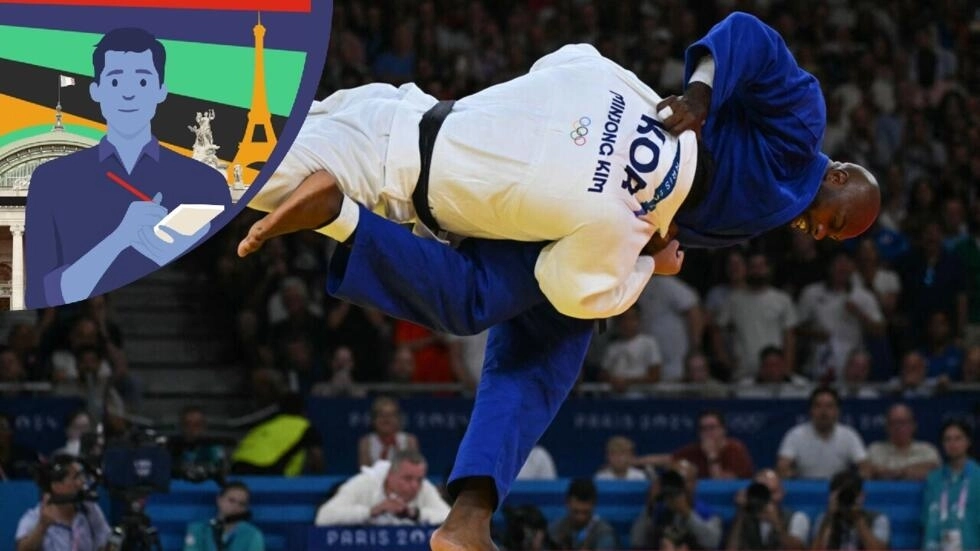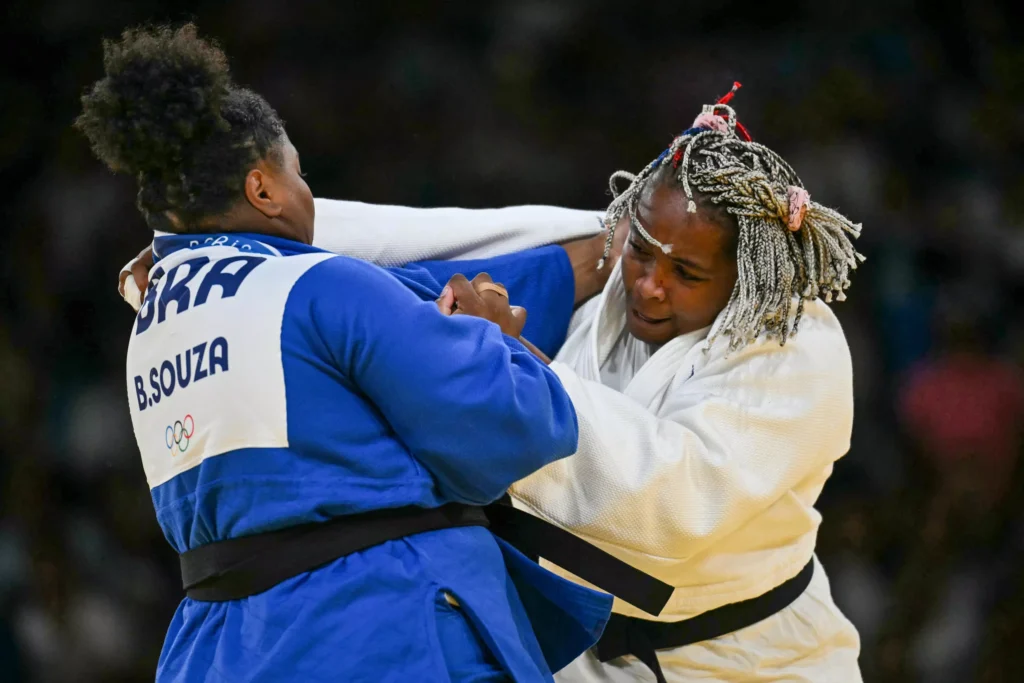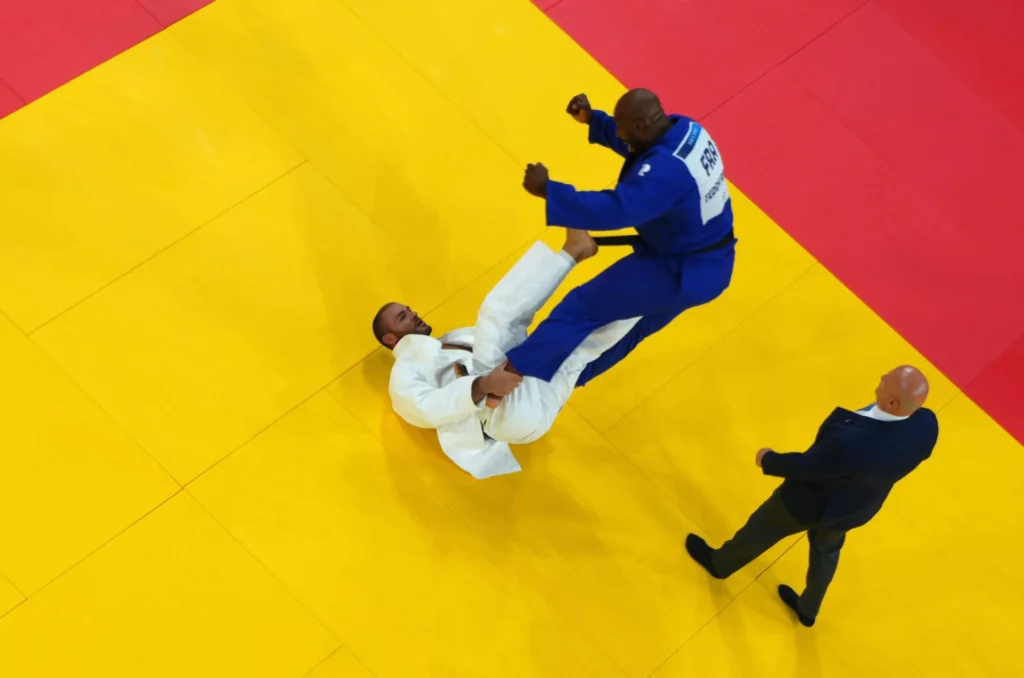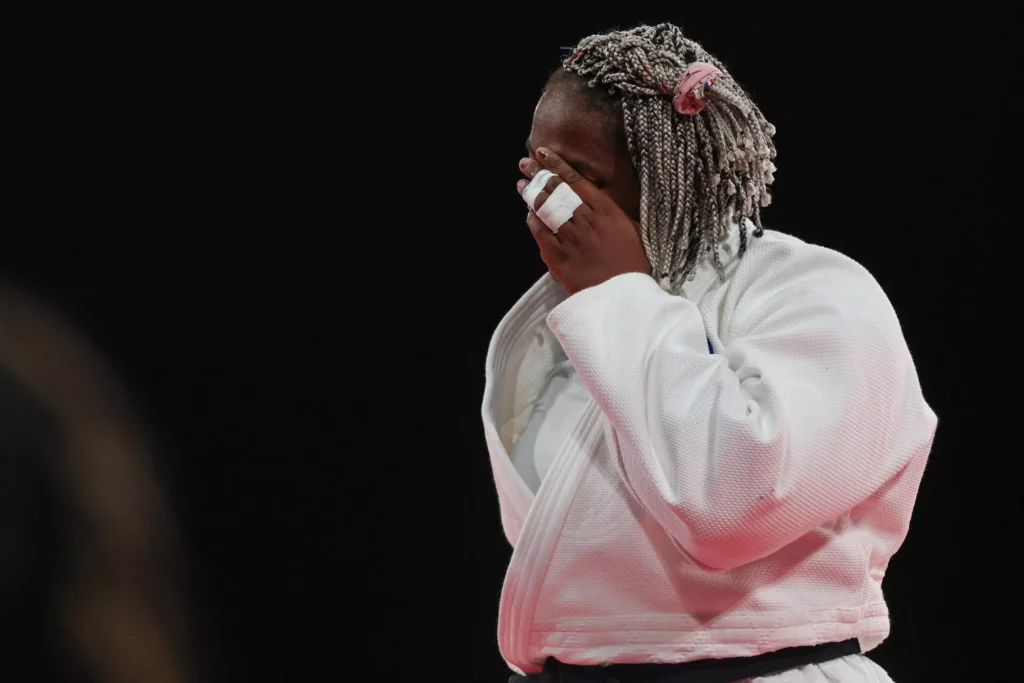From our Olympics correspondent in Paris – Tempers ran high Friday in Paris’s pop-up Champs de Mars Arena, with Georgian judoka Guram Tushishvili disqualified after throwing a tantrum following his defeat at the hands of French judo giant Teddy Riner. Riner went on to win his fourth Olympic gold medal, with Brazil’s Beatriz Souza securing first place in the women’s competition after beating French hopeful Romane Dicko in the semi-finals.

One of the legion of French fans has smuggled what sounds like a snare drum into Paris’s Champ de Mars Arena, and the Gallic chants that shake the packed stadium throughout the evening are backed by a harsh, martial beat. As France’s judo giants throw challenger after challenger to the mat, the abrupt thunder of a vuvuzela cuts through the tumult, a clarion call urging the two judokas on to ever greater feats of strength.
It feels appropriate. Custom-made for the Paris Olympics, this “pop-up Grand Palais” has been built on the expansive public park that stretches between the Eiffel Tower and the École militaire, a sprawling military academy founded in the 18th century.
Overlooking the red and yellow tatami mats in the centre of the arena is a bronze sculpture of Joseph Joffre, marshal of France and victor of the Battle of the Marne in World War I. He sits astride a champing horse, his cape trailing behind him, a baton of command clutched in his imperious metal fist. If he’s at all surprised to find himself in a judo stadium instead of under the open sky, he doesn’t show it.
Friday morning marks the elimination rounds of the men and women’s judo, where the world’s heavyweight judokas will fight it out on the mat to determine who makes it through to the afternoon’s finals. The French supporters are here in force, and they’re here for gold – floating through the crowd are the cut-out faces of Teddy Riner and Romane Dicko, who fans are hoping to crown as king and queen of today’s competition.
Riner, who was one of the athletes that lit the Olympic cauldron in the Paris Olympics’ Opening Ceremony a week ago, seems a safe bet. The 35-year-old colossus, who comes from France’s overseas territory of Guadeloupe in the Caribbean, won gold medals in the individual judo in London and Rio, and in the team competition in Tokyo. Dicko, for her part, won bronze in Tokyo and has been training hard ahead of the Paris Olympics.

The crowd is – well, partisan doesn’t really begin to cover it. Whenever Dicko or Riner’s names come up on the screen, the whole stadium shudders with the noise long before the athletes have actually set foot in the arena. Dizzy in the throes of patriotic feeling, the crowd launches into La Marseillaise more than once, belting out the chorus – “To arms, citizens!” – with such raw conviction that you start to think the École militaire missed a trick by not setting up a recruitment centre at the door.
Then Riner steps onto the mat, and the crowd is overcome. In keeping with the emphasis on gender parity at these Games, the men and women’s bouts take place side by side throughout the elimination rounds. When Riner lays hands upon his opponent, the women on the neighbouring tatami might as well be knife-fighting for all the crowd would notice.
The other competitors seem to be taking the crowd’s uneven enthusiasm in good spirit. Speaking after his elimination, Senegalese athlete Mbagnick Ndiaye said that he had loved the arena’s raucous atmosphere.
“It’s an audience of connoisseurs,” he said. “Most of the people in the stands know me. They’re used to seeing me competing or training. So there it is, I really felt at home. I heard my name everywhere. They were all really behind me, and it’s a real pleasure. It’s always a pleasure to fight in France.”
Not everyone takes it in their stride, and tensions start to run high as the afternoon wears on. After a failed throw in his quarter final bout against Riner leaves him flat on his back, Georgian competitor Guram Tushishvili shoves his foot into the French heavyweight’s groin, levering his unresisting opponent down onto the tatami. Furious, he stands over Riner, waving his hand in his face until the Frenchman swats it away. When he goes to stand up, Tushishvili sends him sprawling back onto the mat with a contemptuous knee to the ribs.

The crowd is aghast – these kinds of histrionics are almost unheard of in professional judo. The referee tries to separate the two men, though it is unclear what exactly he’d be able to do if the two titans started trading blows. Before anyone has time to start looking for a tranquiliser gun, the scuffle is over. The two men shake hands and the Georgian storms off the mat, stripping the gi from his sweat-slicked back. He’s disqualified from the remaining competitions.
Speaking after the competition, Riner is gracious.
“It’s tense, but I can understand,” he said. “The frustration of not winning, the frustration of telling yourself that you’re not going to be an Olympic champion. I wouldn’t blame anyone for it.”
In the women’s judo, Dicko casts down fighter after fighter until she finds herself face to face with Brazil’s Beatriz Souza in the semi-finals. The two women’s hands lock together with terrible strength, Dicko’s white braids whipping around her face.
Their hands scrabble across each other’s gi, furiously searching for leverage. Finally, Souza drags Dicko down to the mat, her arm pinned. They lie side by side, fighting for position, until Souza twists around and flattens her adversary against the floor. It’s over. Dicko stays on the mat a moment longer, her face buried in her hands. At the end of the evening, Souza stands highest on the winner’s podium, the gold medal shining around her neck.

Dicko took the loss hard.
“I’m gutted. It’s really not why I came here today,” she said after the competition, the bronze metal dull against her gi.
“Judo is a sport where everything can be turned upside down in a second.”
Riner fares better. Staring down Korean fighter Kim Min-jong in the final round, he sweeps the judoka’s legs from under him and hurls him onto the mat less than two minutes into the fight. Earlier in the afternoon, he had come crashing down on his fallen opponents as if from a great height, leaving some uncertainty as to whether they were going to get back up. This time, his pin feels perfunctory – in a second he is back on his feet, his fists thrust into the air in triumph.
The noise is staggering. Riner moves through the crowd like royalty, shaking hands, clasping supporters to his breast, towering over even the other medallists. French President Emmanuel Macron is there too, trailing cameras, his shirt-sleeves precisely rolled back. He waits his turn like everyone else.

